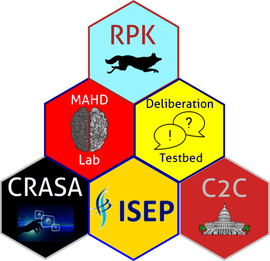Community Responsive Algorithms for Social Accountability (CRASA):
CRASA is an NSF-funded community-based participatory research project to help establish a benchmark for accountability of algorithms used in public policy. It is a collaboration between faculty in political science, computer science, and the law center at the University of Houston (UH), as well as a range of participants from industry, government, community advocacy, the legal profession, and academia. The project specifically focuses on the use of technologies in local government, with the Houston area as a primary field for evaluation. You can find out more on the project's website.
The Deliberation Testbed:
The ability to discuss political issues with others is a critical part of democratic citizenship, and tends to improve with practice. Opportunities for students to develop these skills in classes designed for civic education are, however, all too rare. The goal of the Deliberation Testbed is to provide a resource for instructors to have their students participate in high-quality, small group political deliberation with very low investment on their part. At the same time, students' participation facilitates powerful experiments by the research team to improve our understanding of political deliberation. You can find out more about the Deliberation Testbed on the project's website.
Initiative for Sustainable Energy Policy (ISEP):
ISEP is a research collective that uses cutting-edge social and behavioral science to solve this global challenge. Centered at Johns Hopkins University, our research collective identifies and tests innovative policy solutions for the global energy transition that advance three central goals: impact, justice, and growth. You can find out more about ISEP at our website.
Connecting to Congress (C2C):
Connecting to Congress is the flagship research initiative at The Ohio State University's Institute for Democratic Engagement and Accountability (IDEA), which aims to create authentic, actionable engagement between Members of Congress and the full range of their constituents. The initiative’s goal is to add to Congress’ capacity to engage in productive, deliberative conversations with its constituents and to provide analysis of how these deliberations affect both constituent opinion and Members’ decision making. The initiative is the followup to Congress 2.0, the first-eve series of political science field experiments with sitting Members of Congress. You can find out more about C2C and IDEA at their website.
CRASA is an NSF-funded community-based participatory research project to help establish a benchmark for accountability of algorithms used in public policy. It is a collaboration between faculty in political science, computer science, and the law center at the University of Houston (UH), as well as a range of participants from industry, government, community advocacy, the legal profession, and academia. The project specifically focuses on the use of technologies in local government, with the Houston area as a primary field for evaluation. You can find out more on the project's website.
The Deliberation Testbed:
The ability to discuss political issues with others is a critical part of democratic citizenship, and tends to improve with practice. Opportunities for students to develop these skills in classes designed for civic education are, however, all too rare. The goal of the Deliberation Testbed is to provide a resource for instructors to have their students participate in high-quality, small group political deliberation with very low investment on their part. At the same time, students' participation facilitates powerful experiments by the research team to improve our understanding of political deliberation. You can find out more about the Deliberation Testbed on the project's website.
Initiative for Sustainable Energy Policy (ISEP):
ISEP is a research collective that uses cutting-edge social and behavioral science to solve this global challenge. Centered at Johns Hopkins University, our research collective identifies and tests innovative policy solutions for the global energy transition that advance three central goals: impact, justice, and growth. You can find out more about ISEP at our website.
Connecting to Congress (C2C):
Connecting to Congress is the flagship research initiative at The Ohio State University's Institute for Democratic Engagement and Accountability (IDEA), which aims to create authentic, actionable engagement between Members of Congress and the full range of their constituents. The initiative’s goal is to add to Congress’ capacity to engage in productive, deliberative conversations with its constituents and to provide analysis of how these deliberations affect both constituent opinion and Members’ decision making. The initiative is the followup to Congress 2.0, the first-eve series of political science field experiments with sitting Members of Congress. You can find out more about C2C and IDEA at their website.

